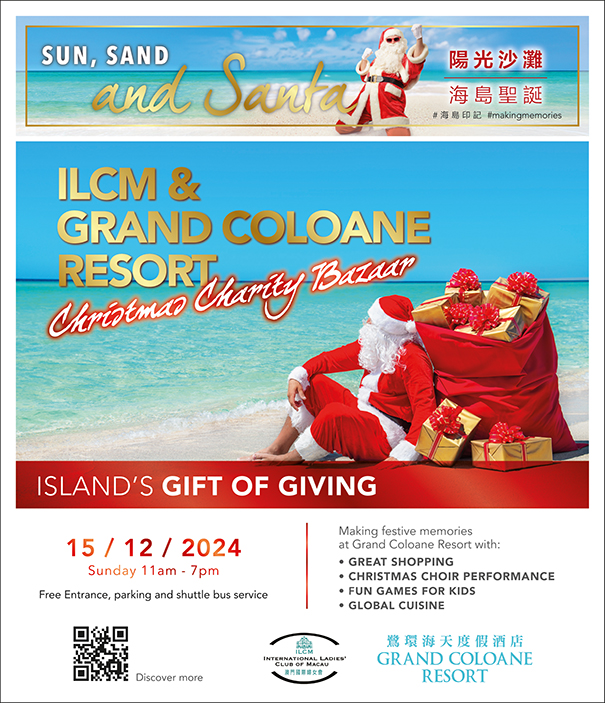Finding Timor-Leste Flavors in China
If you walk into a five-star hotel in the Chinese city of Macao and order a cup of coffee, there’s a good chance it’s brewed from Arabica beans harvested in Ermera, the coffee-producing heart of Timor-Leste.
“Timorese coffee farmers cultivate coffee organically,” says Charles Shi, owner of Macau Coffee Company Limited, a Macao-based roastery that processes coffee beans from Timor-Leste and distributes them in China. “Because of its exceptional quality, a cup of Timor coffee costs at least ten yuan more than regular coffee.”

Coffee products made by Macao Coffee Company Limited. – Gao Song, CGTN
But coffee isn’t the only Timorese product making its way into China. While the island nation primarily exports crude petroleum to China, agriculture remains one of the most vital sectors in Timor-Leste. In addition to coffee beans, specialty agricultural products like Kukui nut oil and black pepper have also found a foothold in Chinese markets.
“Timorese Kukui nut oil is an excellent carrier oil for skincare products,” says Kaiser Pang, Assistant to the Chairman of Francine Chicard, a Macao-based flavors and fragrances company. The firm not only sells the oil as an ingredient but also incorporates it into its aromatic products. “We’ve been steadily increasing our imports from Timor-Leste,” Pang adds.

Products made from Timorese Kukui nut oil on display in Shanghai, China. – Francine Chicard
There’s a notable connection between Macau Coffee Company Limited and Francine Chicard: both are Macao-based companies sourcing Timor-Leste ingredients to cater to the vast Chinese market.
These enterprises are just one example of how Macao fosters connections. Over the past 25 years since its return to China, the Macao Special Administrative Region (SAR) has solidified its role as not just a bridge connecting China and Timor-Leste, but also a Commercial and Trade Co-operation Service Platform between China and Portuguese-speaking Countries.
Macao: A Platform for Cooperation
When it comes to building ties with Portuguese-speaking countries (PSCs), the multicultural city of Macao holds a unique position. With over 400 years of Portuguese rule in its history, Macao retains both visible and invisible traces of this heritage.
The visible influences are easy to spot: the ceramic tiles on Macao’s pavement, Portuguese road signs, and colonial-era architecture that blends seamlessly with modern Chinese urban landscapes.
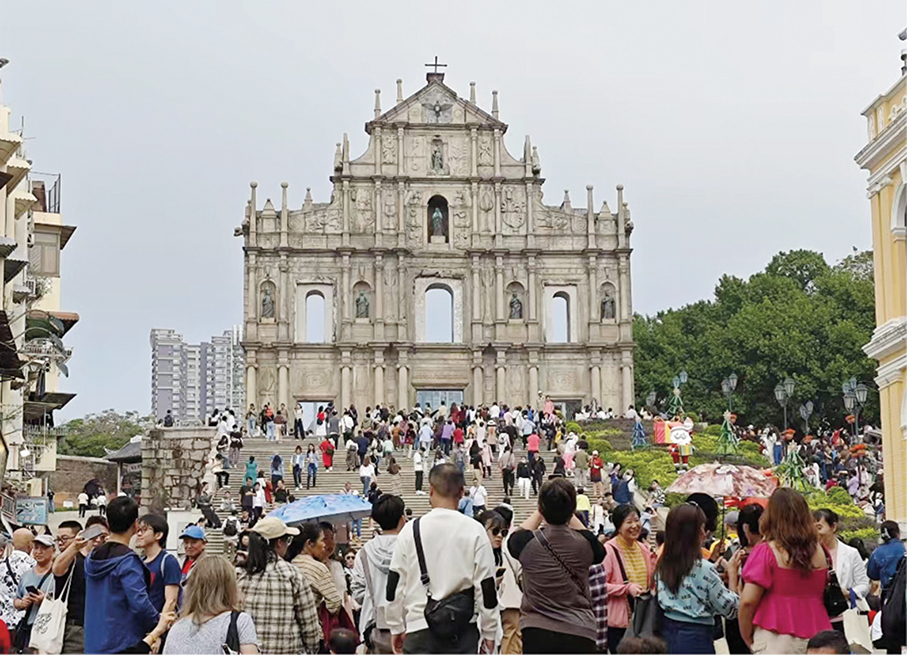
The Ruins of St. Paul’s, a famous landmark in Macao. – Gao Song, CGTN
On the other hand, the invisible traces run deeper, shaping Macao’s cultural identity and its role as a bridge. These include linguistic ties, with Portuguese an official language alongside Chinese, and the city’s public administration and legal system, which are based on those of Portugal. These intangible elements have helped Macao cultivate an extensive connection with PSCs, which collectively represent a population of over 300 million.
Since Macao’s return to China in 1999, China’s “One Country, Two Systems” policy has allowed the SAR to preserve many of these Portuguese characteristics and leverage them to promote cooperation.
This brings us to 2003, when the Forum for Economic and Trade Cooperation Between China and Portuguese-Speaking Countries was established, with Macao soon after designated as its permanent secretariat. Commonly referred to as ‘Forum Macao,’ the platform has grown to include China and nine PSCs: Angola, Brazil, Cabo Verde, Guinea-Bissau, Equatorial Guinea, Mozambique, Portugal, Timor-Leste, and São Tomé and Príncipe.
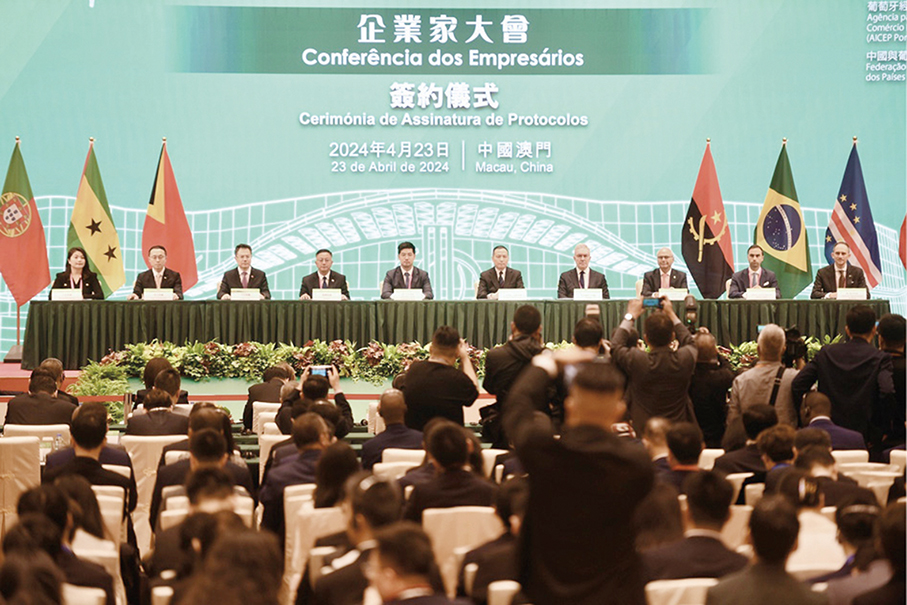
The Conference of Entrepreneurs at the 6th Ministerial Conference of the Forum for Economic and Trade Co-operation between China and Portuguese-Speaking Countries (Macao), April 23, 2024. – CFP
To date, six Forum Macao Ministerial Conferences and one Extraordinary Ministerial Meeting have been held. The forum has also launched a development fund and established centers to promote various areas of China-PSCs cooperation, including food distribution, conventions, and support for small and medium enterprises.
The Macao SAR has also put forward a series of measures to assist Forum Macao in reaching its goals. This includes providing “China-PSC Business Compass” services to help Chinese and PSC firms tapping into each other’s market.
Closer Ties Between China and Timor-Leste
China’s rapid economic growth over the past four decades has greatly expanded trade and investment with PSCs. According to Ji Xianzheng, Secretary-General of the Secretariat of Forum Macao, trade between China and PSCs reached $220.9 billion in 2023 – approximately 20 times the volume when the forum was first established. By the end of 2023, China’s cumulative investments in PSCs totaled nearly US$80 billion, while revenues from completed contract projects amounted to approximately $140 billion.
How does Timor-Leste fit into all this? At first glance, bilateral trade between Timor-Leste and China might appear modest – accounting for just 0.15 percent of all trade between Lusophone countries and China in 2023. However, this trade has grown remarkably since Timor-Leste’s independence in 2002, surging from a mere $1.07 million in 2003 to US$435 million in 2022 – an astounding 400-fold increase.
This growth reflects the enduring friendship and mutual trust between Beijing and Dili. China was the first country to recognize Timor-Leste’s independence and establish diplomatic relations with the nation. In 2023, the two sides elevated their ties to a Comprehensive Strategic Partnership. A historic milestone followed in July 2024, when President José Ramos-Horta became the first Timor-Leste President to pay a state visit to China.
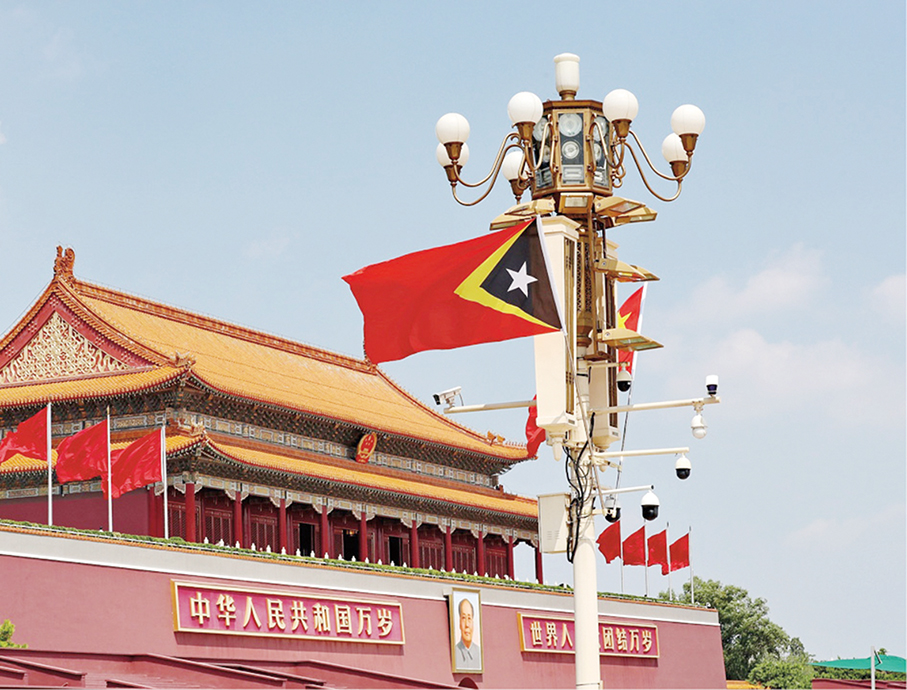
The national flags of China and Timor-Leste were displayed at Tiananmen Square in Beijing to welcome Timor-Leste’s President, José Ramos-Horta. July 28, 2024. – CFP
Macao’s role as a bridge in this relationship is recognized by both countries. In a joint statement in July, China and Timor-Leste commended Forum Macao for its role in fostering mutually beneficial cooperation and economic ties. They also agreed to encourage the establishment of sister-city ties between the Macao SAR and Dili – a goal realized in September 2024.
Looking ahead
The sixth Forum Macao Ministerial Conference, concluded in April this year, saw the signing of a Strategic Plan for Economic and Trade Cooperation (2024-2027). The strategic plan put forth 20 measures to boost cooperation. One section dedicated to enhancing Macao’s role as a platform notably mentioned Hengqin for the first time.
As China ramps up the economic integration in the Guangdong-Hong Kong-Macao Greater Bay Area, the Hengqin island in Zhuhai, Guangdong province, was designated as the Guangdong-Macao In-depth Cooperation Zone in 2021. Boasting an area of 106 square kilometers, which is over three times that of Macao, Hengqin not only provides opportunities for Macao businesses to expand but also helps in enhancing Macao’s role as a platform.
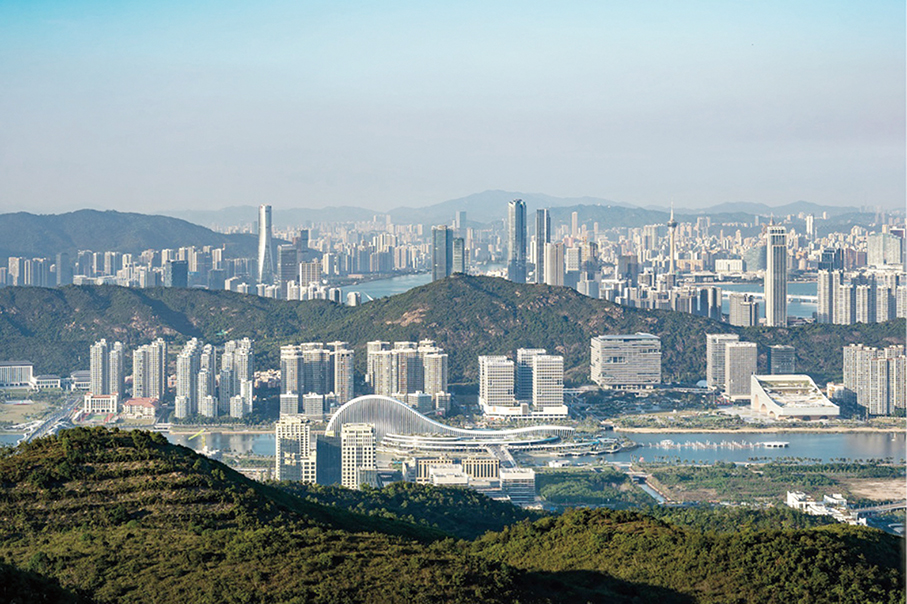
Hengqin and Macao. – CFP
Macao-Hengqin integration is spanning a plethora of areas. In 2023, with the support of Macao SAR, Zhuhai, and Hengqin, the Centre for Science and Technology Exchange and Cooperation between China and Portuguese-Speaking Countries (CSTCP) was established in Hengqin, aiming to deepen technological cooperation between the two sides. The recent strategic plan also voiced further support for Hengqin to build a financial services platform between China and PSCs, with Hengqin expected to assist Macao in developing a bond market using RMB and MOP.
The road ahead is clear. With its unique cultural heritage, strategic position, and institutional frameworks, the city of Macao is in prime position to serve as a vital platform for trade and investment cooperation between China and PSCs. As Macao celebrates the 25th anniversary of its return to motherland, its role as a super connector between China and the Lusophone world is set to deepen.
– CGTN

